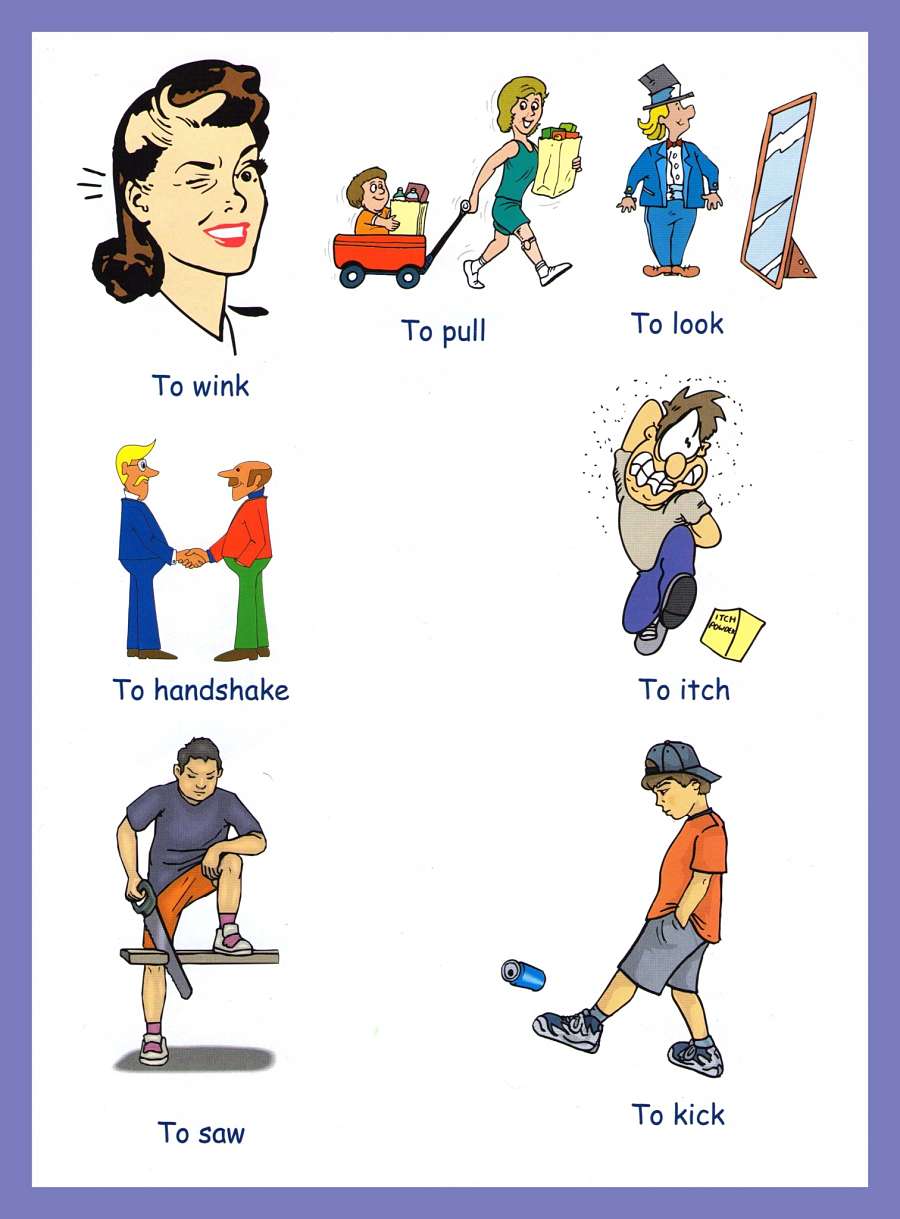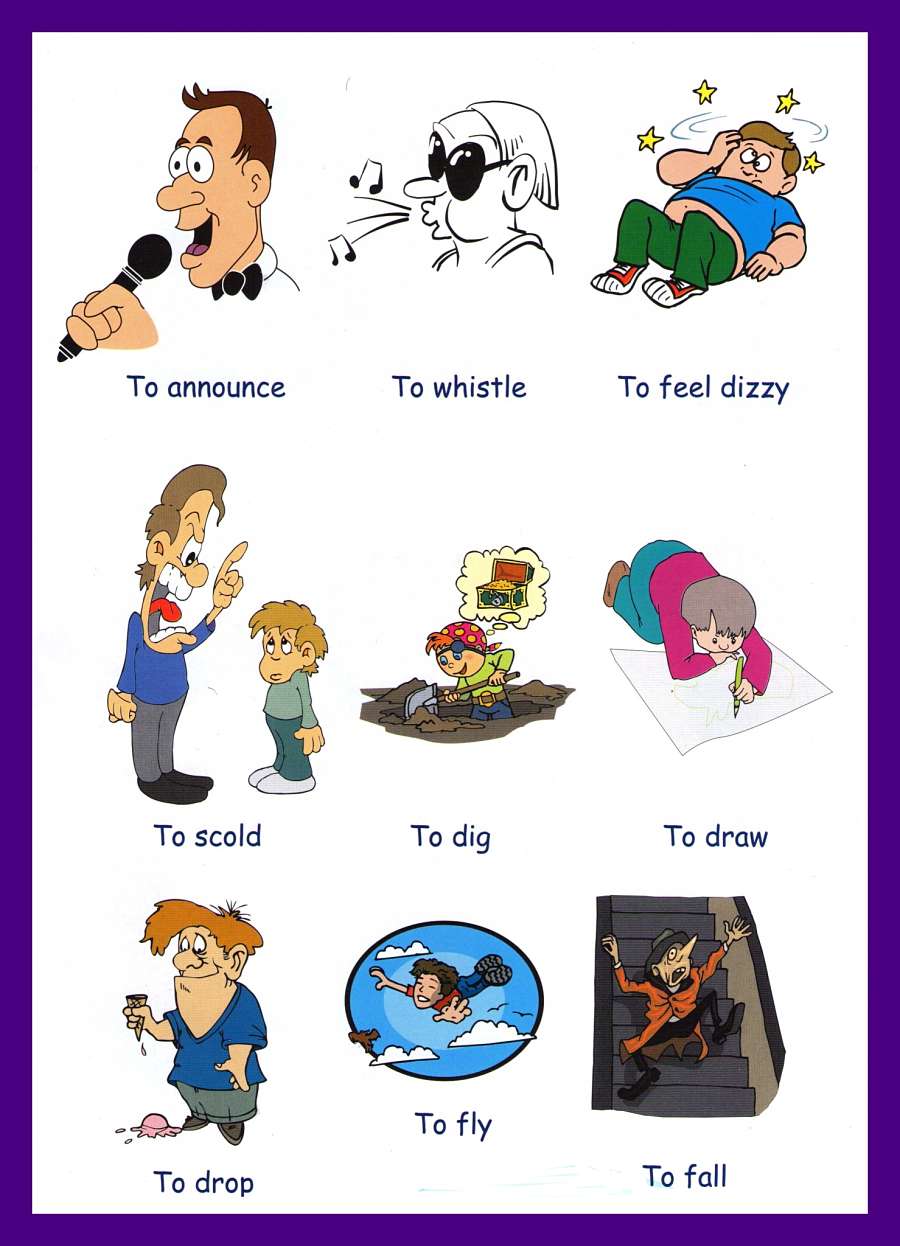Pictures Of Verbs For Children
You can find similar Spanish verb practice for kids with -er and -ir verbs here. Of course, you should try to incorporate verb practice into communicative activities as much as possible. The pictures support the meaning of the verbs, but be sure to include actions and other visuals. Spanish verb conjugation does not have to be boring.
List of different types of verbs for kids in English. Learn these frequently used verbs with verbs pictures to improve and enhance your vocabulary in English.
Learn more with extensive list of verbs in English through pictures and examples…
Common Verbs for Kids
Action Verbs for Kids
Action Verbs Vocabulary
- Ride
- Sit down
- Stand up
- Fight
- Laugh
- Read
- Play
- Listen
- Cry
- Think
- Sing
- Watch TV
- Dance
- Turn on
- Turn off
- Win
- Fly
- Cut
- Throw away
- Sleep
- Close
- Open
- Write
- Give
- Jump
- Eat
- Drink
- Cook
- Wash
- Wait
- Climb
- Talk
- Crawl
- Dream
- Dig
- Clap
- Knit
- Sew
- Smell
- Kiss
- Hug
- Snore
- Bathe
- Bow
- Paint
- Dive
- Ski
- Stack
- Buy
- Shake
Action Verbs Image
Common action Words in English with pictures.
Verbs of Body Movement
Body Movement Verbs List
- Bend
- Lift
- Carry
- Kneel
- Hold
- Sit
- Drag
- Jump
- Leap
- Pick up
- Punch
- Pull
- Dive
- Push
- Run
- Lean
- Squat
- Throw
- Tiptoe
- Walk
- Hit
- Catch
- Kick
- Kiss
- Clap
- Laugh
- Dance
- Break
- Stand
- Jog
- March
- Wave
- Talk
- Open
- Cartwheel
- Put down
- Stretch
- Drop
- Point
- Slip
- Trip
- Look
- Cry
- Lie down
- Pour
- Crawl
Verbs of Body Movement Verbs Images
Cooking Verbs for Kids
Cooking Verbs Vocabulary
- Break
- Melt
- Spread
- Layer
- Roll out
- Fry
- Peel
- Mix
- Whip
- Saute
- Taste
- Cut
- Chop
- Slice
- Grate
- Boil
- Steam
- Pinch
- Pour
- Add
- Barbecue
- Roast
- Bake
- Stir
- Weigh

Cooking Verbs for Kids Image

Daily Routines and Activities
Learn how to describe your daily routines in English.
Daily Routines and Activities Vocabulary
- Do the laundry
- Hang the clothes
- Iron the clothes
- Make the bed
- Go to bed
- Wake up
- Brush the teeth
- Drive to work
- Get home
- Take a bath
- Brush your hair
- Surf the net
- Play with friends
- Go to school
- Go shopping
- Exercise
- Wash the car
- Get dressed
- Go out with a friend
- Take pictures
- Play the guitar
- Water the plant
- Go for a walk
- Work
- Have breakfast
- Have lunch
- Have dinner
- Make dinner
- Fold the laundry
- Surf the net
- Feed the dog
- Take a taxi
- Wait for the bus
- Paint the picture
- Have a break (U.K) – Take a break (U.S)
- Walk the dog
- Take out the rubbish (U.S)
- Sweep the floor
- Rake the leaves
- Read the news
- Clean the window
- Cut the grass
- Do the dishes
- Paint the house
Daily Routines and Activities Image
Classroom Verbs for Kids

Classroom Verbs Vocabulary
- Teach
- Think
- Spell
- Give
- Study
- Read
- Cut
- Experiment
- Observe
- Listen
- Play
- Sing
- Say
- Draw
- Count
- Calculate
- Open
- Close
- Paint
- Show
- Explain
- Ask
Classroom Verbs Pictures
Housework and Repair Verbs
Household Chores List
- Fold
- Iron
- Hang
- Dry
- Make (the bed)
- Change (the sheets)
- Vacuum
- Take out (the rubbish/ garbage)
- Wipe off (the table)
- Scrub
- Repair
- Tighten
- Nail
- Drill
Housework and Repair Verbs Image
Restaurant Verbs for Kids
Restaurant Verbs Vocabulary
- Give – The waiter gives me the menu.
- Drink – Can I have something to drink?
- Serve – They serve good nosh in the cafeteria.
- Pay – Can I pay by installment payment?
- Eat – You can’t eat your cake and have it.
- Cook – The pizza will then take about twenty minutes to cook.
- Hold – Hold the knife at an angle.
- Light – Better to light one candle than to curse the darkness.
- Order – What do you suggest I order?
- Spread – He spread some strawberry jam on his toast.
- Lift – He couldn’t lift the table and no more could I.
- Write – Write it down on a piece of paper.
- Slice – It’s best to slice into a rich cake from the middle.
- Stack – They are specially packaged so that they stack easily.
- Set (the table) – He is setting the table…
Restaurant Verbs Images
Sport and Exercise Actions
Sport and Exercise Verbs Vocabulary
- Walk – Don’t try to walk before you can crawl.
- Run – Do not run too fast after gain.
- Stretch – Breathe in through your nose as you stretch up.
- Jump – Can you jump over the river?
- Bounce – Bounce the ball and try and hit it over the net.
- Serve – Serving is arguably the most important aspect of the game, as it is the one shot which has to be in every single rally.
- Lie down – For this exercise, it is best to lie down, or sit with both feet on the floor.
- Sit – Sit on the floor, stretching your legs out in front of you.
- Bend – Lie flat and let your knees bend.
- Kneel – Do not run, stand, kneel or spin in the slide.
- Ride – Life is a horse, and either you ride it or it rides you.
- Kick – The kids love to kick a ball against my wall.
- Hop – I tried to hop on my good foot while holding onto Jim…
Sport and Exercise Verbs Images
Common Verbs for Kids Video
As your child develops language, the first few words are usually names and objects (nouns) such as Dada,ball, and dog. Around 24 months, the child’s vocabulary repertoire starts to include verbs. Verbs are action words such as go, walk,jump, eat, and come. Understanding and using verbs allow the child to communicate in sentences rather than 1- word phrases.
Real Pictures Of Verbs For Children
Language acquisition varies among children, but by 24 months children typically express around 40 verbs. Children with an increased verb acquisition by 24 months typically have more advanced grammatical skills six months later. For children producing less than 10 verbs at 24 months, it is not a concern as long the child is learning several new verbs every month. If you are concerned about your child’s language acquisition, contact Lumiere Children’s Therapyfor a speech evaluation.
Below are some strategies to help your child learn more verbs:
· Books. Creating an opportunity for story time in your day, whether morning or night, is fundamental for language development. Here are some great books to introduce verbs: To Root, To Toot, to Parachute: What Is a Verb? By Brain P. Clearly, Slide and Slurp, Scratch and Burpy by Brian P Clearly, and Nouns and Verbs have a Field Day by Robin Pulver.
· Pretend Play. Imaginary play is a great chance to label everyday action verbs. Model verb phrases throughout play, for instance, feedingand changinga baby doll, flying an airplane, or cooking in a play kitchen.
· Modified Charades. Play the video Actions 2 Verbs with Lyrics, and act out the actions with your child as it pops up on the screen. Once your child is familiar with a few verbs, practice by asking “show me dance’. If there are more children in the household, have one person act out the verb while the others guess.
· Children’s preferences. Identify the toys and activities your child shows interest in and figure out a list of verbs that are associated. For instance, if your child likes to play soccer, auditory bombard your child with verbs associated with the sport: kick, pass, and shoot.
· Flashcards: Verb flashcards are a great tool to demonstrate pictures of unfamiliar verbs. Make your own cards by printing off doubles of each action picture to play memory!
Pictures Of Action Words
LUMIERE THERAPY TEAM🖐️
References:
Action Verbs For Children
“8 Fun Activities for Teaching Verbs .” Reach to Teach, www.reachtoteachrecruiting.com/blog/fun-activities-teaching-verbs+http://www.theroadmap.ualberta.ca/understandings/parents/25-36#1.
Gotzke, C. & Sample Gosse, H. (2007). Parent Narrative: Language 25 - 36 Months. In L.M. Phillips (Ed.), Handbook of language and literacy development: A Roadmap from 0 - 60 Months.
Hadley, P. A., Rispoli, M., & Hsua, N. (2016). Toddlers’ Verb Lexicon Diversity and Grammatical Outcomes. Language, Speech, and Hearing Services in Schools, 47, 44–58.
Tara, and Rhonda Griswol. “Teaching Verbs with Picture Books.” Embark on the Journey, 21 Mar. 2018, embarkonthejourney.com/teaching-verbs-with-picture-books/.
“Verbs Pave the Way for Language Development.” Does Child Care Make a Difference to Children's Development?, www.hanen.org/Helpful-Info/Articles/Verbs-Pave-the-Way-for-Language-Development.aspx.